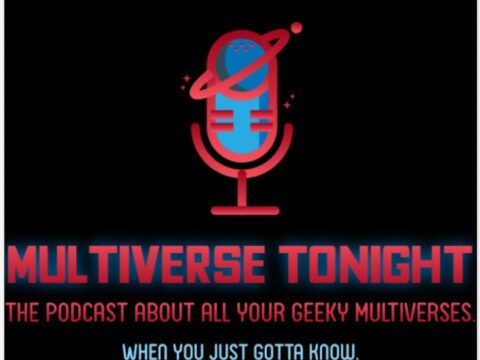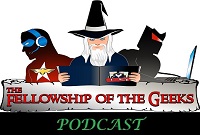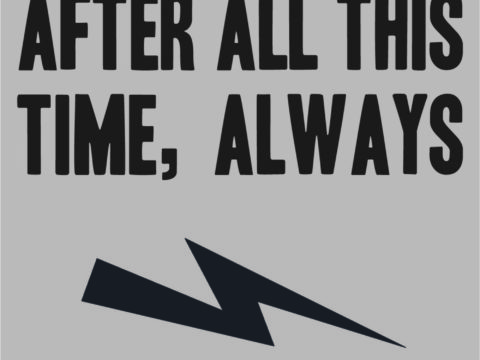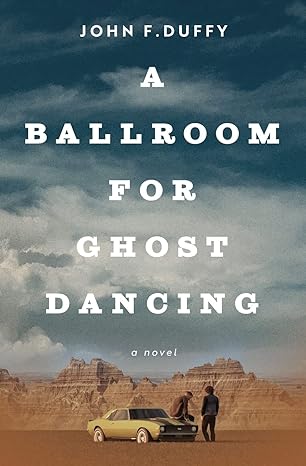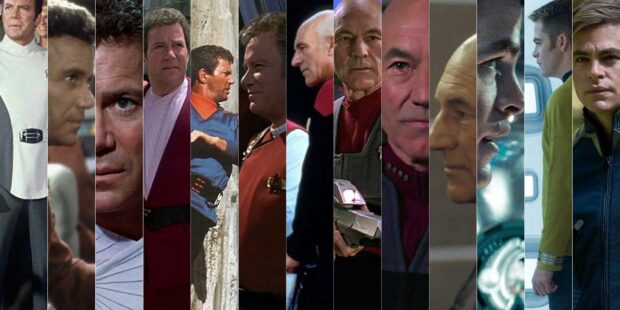
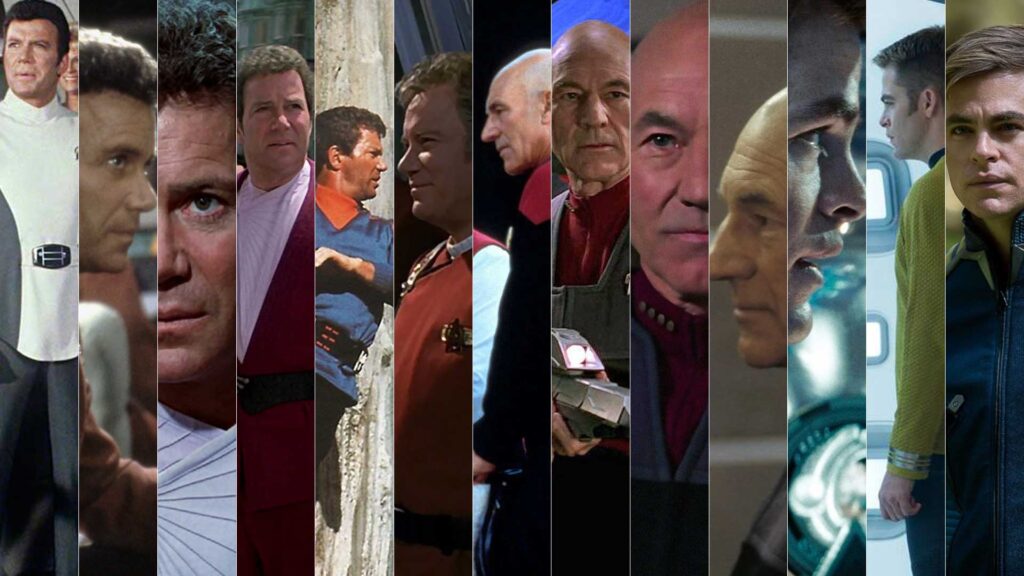
When I was a kid, we had a small black and white TV in the kitchen. Why? Mostly, from what I remember, so my mom could watch reruns of Star Trek while she cooked dinner. I know that we went as a family to see Star Trek: The Motion Picture in the theaters when it came out, although I don’t really remember much about it. I do, however, very clearly remember waiting in line to get into the theater on opening night of Star Trek II: The Wrath of Khan, and watching people exiting from the previous showing in tears.
As it happened, I started dating my girlfriend right when Star Trek: The Next Generation first premiered, and she was kind enough to be willing to sit and watch it with me, and even enjoyed it. It’s final episode, as it turned out, would air just a few months before we married.
So while I definitely identify more as a Star Wars fan, Star Trek has always been part of my life.
I have seen every Trek film at some point. Some, just once, while it was in the theaters. Others a few times, and one so many times I have the dialog memorized. But like many people, I have watched them spread out over a span of over 40 years. But this week, I decided to binge them, and watch all 13 movies back-to-back-to-back. Here are my takes on each film, many with fairly fresh eyes.
All of these movies are available for streaming on Paramount+.
Star Trek: The Motion Picture (1979). I’m pretty sure I have seen this movie at least once or twice since that first time in the theater in 1979. I remembered the broad strokes: a Voyager probe as the villian, horrible uniforms, a bald woman somehow at the center of the action. But beyond that, my only other real memory was that my Trek-loving mom hated it. Seeing it now, though? It turns out it’s not actually that terrible. It has the big scope that you’d expect (hope) from a TV show jumping to the big screen (a trait not always present in later films.) It’s at times too slow and too talky, it has by far the lamest subtitle in the franchise, and some of it definitely doesn’t make a lot of sense, but overall? It’s a decent-enough movie that I’d rate solidly in the middle of the pack. Bonus points, though, for Jerry Goldsmith’s score, the main theme of which would go on to become the title theme for The Next Generation. Three out of five stars.
Star Trek II: The Wrath of Khan (1982). That movie I mentioned above that I’ve seen enough to have the dialog memorized? This is it. It’s a genuine cinematic masterpiece. From Ricardo Montalban chewing scenery with every perfectly-delivered line to the emotional core to the philosophical discussions of life and death, this is what every Star Trek film should be. No, actually: it’s what every science fiction film should be. That it also introduces the best uniforms in the franchise, features fantastic effects that fully hold up 39 years later, one of the best scores in the franchise, and one of the most intense and exciting space battles ever shot for any movie, Wrath of Khan is without question the best Trek film ever. Nothing else has even come close. Five out of five stars.
Star Trek III: The Search for Spock (1984). I appreciate the attempt here. While Wrath of Khan essentially ignores the first movie, with only a few thematic references here and there, The Search for Spock is the first true sequel in the series. Unfortunately, it gets weighted down by a rather non-sensical story, a lot of convenient plot devices (Spock just happens to age on the planet to the exact age he needs to be to be played by Nimoy?), and some truly terrible acting (sorry, Merritt Butrick.) It’s one redeeming quality: casting Christopher Lloyd as the Klingon commander. It also introduces what will become a favorite plot point in the franchise: destroying the Enterprise. Perhaps there was no way that a movie could follow Wrath of Khan and not be disappointing, but this movie is actually worse than The Motion Picture, beginning what would become a pattern throughout almost the entire franchise of bad odd-numbered films following, and being followed by, superior even-numbered films. Two out of five stars.
Star Trek IV: The Voyage Home (1986). One of the things that becomes very apparent watching all of the movies over a short period of time is how tonaly inconsistent the franchise is. Rarely is that more apparent than with the broad dramatic comedy that we get with The Voyage Home. I have loved this movie since I first saw it in theaters, not just because it does redeem the franchise after The Search for Spock, but just because it is one of the most fun to watch. It contains some of the best dialog, and while some points are a bit dated–modern audiences would likely miss why having a Russian ask a San Francisco police officer for “directions to the nuclear wessels” is hilarious–overall it holds up. The effects are great (I’ll never understand how it wasn’t nominated for an Oscar, for the whale effects alone), the acting is spot-on, and Leonard Rosenman’s score perfectly evokes the tone of the film. Fun fact: it’s the movie with the least time spent on the Enterprise, with only the briefest of scenes at the very end. Four out of five stars.
Star Trek V: The Final Frontier (1989). Even after reading up on it, I’m still unclear as to what exactly happened with this movie. It could be that Shatner is just a truly horrible director. Or maybe it was scheduling: a writer’s strike delayed the script, and ILM was unavailable to do the effects. Or maybe it had just become set in stone by then that odd-numbered films had to suck. Whatever the reason, The Final Frontier is not just the worst movie in the franchise by far, it’s also one of the worst science fiction films ever. The plot is just stupid, and little more than a lazy retread of the plot of The Motion Picture. The TV show from two decades earlier had better effects. No one seemed to want to be there, and it shows, with every actor obviously phoning it in. The only positive thing that can be said about this movie is that at least it didn’t manage to kill the franchise. But if it had, no one could have really blamed Paramount. One out of five stars.
Star Trek VI: The Undiscovered Country (1991). How do you resurrect a franchise after its star did everything he could to destroy it with the prior film? It’s easy, as it turns out. First, bring back the man who saved the franchise the last time–Wrath of Khan director Nicholas Meyer. Second, go back to the storyline that saved the franchise last time: as with Khan, The Undiscovered Country just ignores the crap that came before it, and is instead fourth film that completes the story begun with Khan. The movie actually opens with once again showing the destruction of the Enterprise from The Search for Spock (and so, I think, should technically count as the second movie to destroy the ship…more to come…) and then splits its time between commenting on the end of the Cold War (it was released just as the Soviet Union was collapsing) and being a good old-fashioned murder mystery. Throw in the franchise’s second great villian as Christopher Plummer steals scenes as a vengeful Klingon, the first Next Generation cameo (Michael Dorn playing an ancestor of Worf, named, uh, Worf), Kirk facing some confusing consequences of letting his carnal desires get the better of him, and you have a taught, action-packed thriller of a movie. It is brought down a bit by an overly long ending with the original crew spending too much time patting themselves on the backs in what they knew would be most of their farewells to the characters, but overall VI continues the “even movies good, odd movies bad” tradition. Three out of five stars.
Star Trek: Generations (1994). The first of the movies to feature the crew of The Next Generation falls largely flat. Most of the time, the movie feels like little more than an extended episode of the TV show, including a ridiculous early scene on a holodeck that has nothing at all to do with the overall story, and Data spending almost two hours of screen time pondering the pros and cons of his emotion chip. The story makes basically no sense, and serves as little more than an excuse to get Kirk and Picard on screen at the same time. Malcolm McDowell tries hard to be the kind of villian we saw with Montalban and Plummer and Lloyd, but he’s given so little to work with here that even he can’t make much of it. The movie does, however, destroy the Enterprise, so it has that going for it. But it’s also an odd-numbered film, even if the studio stopped officially putting the numbers in the title. Two out of five stars.
Star Trek: First Contact (1996). Without question, the best of the Next Generation films. It’s the first (and, as it turns out, only) TNG film that embraces the scope movies provide and doesn’t feel like a long TV episode. (To be fair, though, the show tended to be much more cinematic whenever the Borg showed up.) I remember that despite all it had going for it, I didn’t really enjoy it when I saw it in the theaters, because despite the movie’s best attempts to talk its way out of it, the concept of a Borg Queen was absolutely against everything that we supposedly knew about the Borg up to that point. But watching all of the films together also highlighted another trend in the Trek movies that isn’t apparent watching them years apart: no one associated with Trek has ever cared even a tiny bit about continuity. Once you realize and embrace that fact, it becomes easier to enjoy these movies as semi-stand-alone films that may pull threads from what came before, but is never bound by it. (The most obvious example is of course the way Klingons look, but then there are things like the Klingon Bird of Prey in IV being quite clearly not the same ship as the one in III, even though it’s totally supposed to be, and Khan recognizing Chechov, who wasn’t in the original TV episode with Khan.) And given that, First Contact pretty much works. While it doesn’t hold a candle to Wrath of Khan, it’s actually a very good movie, and certainly deserves its rank among the best movies in the franchise. Four out of five stars.
Star Trek: Insurrection (1998). OK, so treating a Next Generation movie as a movie rather than a two-hour episode of the show worked so well last time, let’s … make a movie that is nothing more than a 2 hour episode of the show. Set almost entertainly planet-side, the movie ponders the Prime Directive (although, not really) and has Data worry about his emotion chip. Because of course he does. This entry in the series (an odd-numbered one, if you’re keeping track) definitely has the most sex of any prior movie in the franchise, with Riker and Troi finally answering the question no one really cared about: yes, they will. But even Picard gets a romantic subplot. But the lackluster story drags down everything else in the movie, making me wonder at times if this project of seeing all of the movies was even worth finishing. And yet, it’s still better than both The Search for Spock and The Final Frontier. Two-and-a-half out of five stars.
Star Trek: Nemesis (2002). The last Next Generation film features an almost-destroyed Enterprise (hey, they hadn’t done that in either of the last two movies, so it was time) and the villianous race Trek uses any time the makeup department didn’t want to deal with coming up with some entirely new look to the Klingons: the Romulans. But a rogue Romulan, because of course that’s almost always a thing, too. The movie is interesting in that it features a very young Tom Hardy as the villian, which alone makes the movie worth watching. The concept behind the character and his motivations aren’t the most creative things Trek has ever come up with: he’s a clone of Picard (?) who is basically going insane. There’s still plenty of “truly, no one cares” Data emotion chip garbage, and the “we care about this even less” RIker/Troi wedding, but once you work through those parts the action is good, the effects are good, and did I mention the very young Tom Hardy? Three out of five stars.
Star Trek (2009). How do you reboot a franchise after almost fifty years? If you’re Trek, of course, you use time travel. But honestly, as excuses to reboot go, breaking off the series into an entirely separate timeline works pretty well. As does this movie. The new cast does a good job of clearly being the characters we know and love while still finding ways to make them their own. And of course the updated effects are spectacular. Still, JJ Abrams has said publicly that he took this movie as essentially an audition so that Lucasfilm would hire him to make the new Star Wars movies, and honestly? All of the warning signs are there. From the at-times extremely lazy story telling to the obsessive need for lens flare, everything that would end up going wrong with that other space franchise has its roots here. I do, however, want to address the most common criticism I see of this movie, which generally goes something like “Star Trek is supposed to be intellectual, not actiony. It’s supposed to be solving problems with minds rather than lasers. Those are what Star Wars is for.” And while I can see how people who were raised on the often painfully slow Next Generation-era–both TV and film–might think that, I have to say that watching all ten of the movies that come before this completely invalidates that argument. It’s particularly true of Kirk, who has always been a “shoot first, think later” kind of guy. I mean, there’s at least as much flying around shooting stuff in Khan as in this movie. First Contact is as close to a straight war movie as any in the series. How many times does the series need to blow up the Enterprise to convince people that it’s always been an action franchise? The only thing that is truly unique about this movie is that it is the first film in the franchise that doesn’t suck after following a movie that didn’t suck, thus breaking the “odd films are always bad” trend. Four out of five stars.
Star Trek Into Darkness (2013). The first truly bad even-numbered film comes in at number 12. For some reason, Paramount decided to let Abrams indulge in literally every one of his worst instincts, from the laziesy of all lazy storytelling–a retread of the best movie in the franchise, minus literally everything that made it the best movie in the francise–to mystery box elements, to unnecessary male gaze crap, to flipping the death at the end, to “oh JK of course he’s not dead”. Even Benedict Cumberbach can’t save this mess. Don’t get me wrong–it’s still nowhere near as bad as The Final Frontier, if for no other reason than they did hire an effects team that knew what they were doing, but this is pretty far down there on the list. Two-and-a-half out of five stars.
Star Trek Beyond (2016). Once again, the franchise follows a debacle with a movie that actually works and manages to restore our faith in Trek. After finally setting off on its fabled five year mission at the end of the last movie and finally free from Abrams (who had by now gone off to ruin Star Wars), Beyond captures the original essence of Trek better than any film in the past two decades. Exploration, discovering new aliens, getting into trouble, and yes, fighting their way out of it by shooting stuff: Beyond has it all. And, of course, that thing that makes this a true Trek film: the destruction of the Enterprise. There’s also some of the most interesting character development in the series, including the growing, grudging friendship between Spock and McCoy, Kirk’s self-doubt, and Sulu’s (newly inclusive) family. It falls apart a bit at the end, with the absolutely ridiculous “saved by the Beastie Boys” scene, but overall the movie holds together very well. It’s almost too bad that, by all reports, this will be the final movie in this timeline, and possibly the final movie with this crew. Although, everything we know about these movies says that the next film would almost certainly be terrible, so maybe giving Taratino his shot wouldn’t be the worst idea. He almost certainly wouldn’t make anything as bad as The Final Frontier. Three-and-a-half out of five stars.

